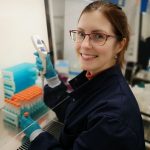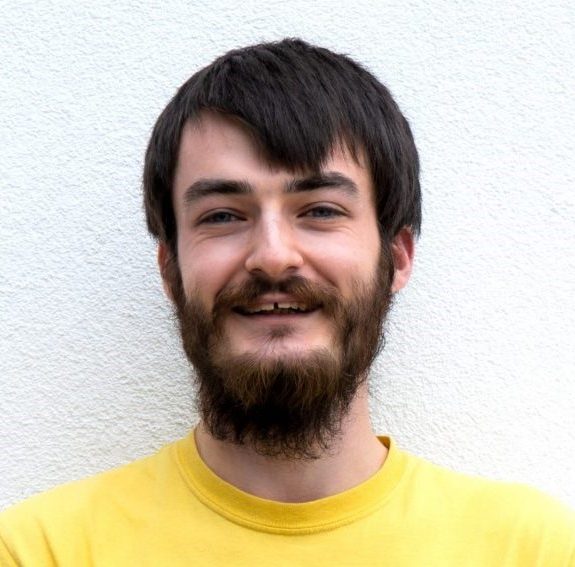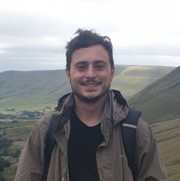Current Final Years
Current Third Years
Current Second Years
Current First Years
Current Final Years
Victoria Armer
Studentship led by Rothamsted Research
Victoria graduated from the University of Bristol in 2020 with a MSci in Biology, where she completed her final year project in the lab of Prof. Alistair Hetherington looking at CO2 and drought-induced signaling pathways resulting in stomatal closure.
During her undergraduate studies, she undertook a BSPP funded summer studentship at The Sainsbury Laboratory in the group of Dr Matthew Moscou, where she investigated the wild barley diversity collection (WBDC) as a source of novel resistance for Pyricularia oryzae (teleomorph Magnaporthe oryzae), the causal agent of blast disease on the Poaceae (true grasses). This opportunity ignited an interest in plant-pathogen interactions, which Victoria hopes to explore further with her PhD project investigating communication mechanisms between the fungal pathogen Fusarium graminearum and wheat, under the supervision of Prof Kim Hammond-Kosack (RRes) and Dr Michael Deeks (Exeter).
Ryan Biscocho
(he/him)
Ryan graduated from the University of Oxford in 2018 with a BA in Biological Sciences, during which he specialised in themes of evolution and genomics. For his undergraduate research project he, alongside Dr Ellie Bath, looked at the effect of sexual conflict in driving aggressive behaviour in Drosophila melanogaster, which led to a publication. Ryan is now expected to graduate with an MRes from the University of Bristol, on the basis of research analysing the expression of introgressions in the wheat genome, under the supervision of Dr Gary Barker.
For his PhD Ryan will be working with Dr Alex Hayward, Prof. Chris Bass and Dr Pablo Orozco-terWengel, researching how transposons have contributed to eukaryote evolution, first by applying this framework to studying animal development, and then in the context of agricultural domestication; the latter constitutes the bulk of his research with potential applications for improving livestock productivity.
Isobel Cole
Isobel graduated with a BSc in Environmental Biotechnology from the University of Plymouth in 2020, where she developed her interest in molecular biology, biochemistry, and photosynthetic organisms. Throughout this, she worked on algal projects at Plymouth Marine Laboratory and secured funding to investigate the potential of macroalgae as a fuel and fertiliser. Her placement year at the University of Exeter focused on expressing, characterising and crystallising enzymes with key industrial applications. She was then introduced to the importance of antioxidant defences and the impact of reactive oxygen species through her dissertation on evaluating the role of glutathione peroxidase.
Combining her interests, she will be investigating the function of the antioxidant ergothioneine, in plants and algae. The PhD will determine the occurrence, synthesis, and functions of the metabolite through biochemical and physiological characterisation of ergothioneine mutants, supervised by Prof Nick Smirnoff, Dr Glen Wheeler (MBA) and Dr Katherine Helliwell.
Amber Connerton
Amber graduated from The University of Exeter in 2018 with a BSc in Biological Science (Microbiology and Infectious Disease). During her studies, she was fascinated by plant innate immunity and plant-microbe interactions, which led her to enrol on a MRes in Molecular Plant and Microbial Sciences at Imperial College. While working on autophagy-related immunity in plants Amber became curious about the spatial and temporal arrangement of plants immune responses.
Following this theme Amber is researching in the laboratory of Dr Michael Deeks, University of Exeter. Amber’s project will address how FORMIN4 and other cargoes are targeted with high precision to sites of immunity. Specifically focusing on the role of small GTPases in defining the response-zone and focusing traffic towards the pathogen.
James Gardner
CASE studentship
James graduated from Exeter University with a Masters in Food Security and Sustainable Agriculture. Having focused on wet lab bioscience during his BSc, James’ MSc project involved comparative genomic study of cultivars of the African subsistence crop, Enset. He quantified a metric called heterozygosity for each strain, and then compared this against their susceptibility to the dangerous bacterial wilt pathogen.
Spending some time working in the RD&E hospital genetics labs since this time, James now hopes to combine his interest in dry and wet lab approaches to address important food security issues in his PhD. Based in the Penryn labs of Professors Bass and Ffrench-Constant, he’ll be endeavouring to understand how a globally significant crop pest (the peach potato aphid) is able to develop resistance to insecticides upon exposure. As part of this study, he’ll also be undertaking rotation projects in web design and insect/plant ecology.
Matthew Houghton
Matt graduated from the University of Bath with a first class honours in BSc Biochemistry. Whilst undertaking his degree, Matt undertook a lab-based project with Dr Stefan Bagby and Mohsina Bashir, developing a method for producing a bacterial hydrophobin that could be used on surfaces of graphene-based biosensors.
His PhD will revolve around answering biological questions utilising the novel Plasmonically Enhanced Whispering Gallery Mode method, at the University of Exeter, with Prof Frank Vollmer. He will begin producing target proteins at the University of Bath with Dr Stefan Bagby, starting with HECT E3 Ubiquitin Ligases, attempting to better understand the mixed-ubiquitin chains that are used in molecular signalling, protein degradation and countless more cellular processes.
Gemma Sutton
Gemma graduated from the Integrated Master of Biology (MBiol) programme at the University of York in 2020. During her degree Gemma completed an Erasmus placement year in Barcelona studying brain tumours in Drosophila melanogaster at the Institute for Research in Biomedicine and the University of Barcelona. For her Masters research project, Gemma worked with Dr Betsy Pownall characterising the development of the extremophile cichlid fish Oreochromis (Alcolapia) alcalica for the first time. She was awarded the Advanced Accreditation Top Project Award from the Royal Society of Biology for her final report.
This has led Gemma to pursue a PhD in the field of developmental biology. She is now working with Dr Steffen Scholpp and Prof Robert Kelsh investigating the function of Wnt signalling in Neural Crest development in zebrafish.
Current Third Years
Shauna Corr
Standard studentship with associate partner: In collaboration with University of the Exeter + Plymouth Marine Laboratory (PML)
(she/her)
Shauna graduated from the University of Exeter in 2014 with a BSc in Biological Sciences. Her thesis investigated the microplastic contamination of the decapod C. Maenas, sparking her interest in marine chemical ecology. From here she worked as an Analytical Chemist analysing agricultural residues to produce reports on environmental impacts, before completing her MRes in Marine Biology (2020).
Merging her interests in analytical chemistry and marine biology she is now undertaking a PhD project investigating seaweed diseases supervised by Dr Michiel Vos (University of Exeter) and Dr Mahasweta Saha (Plymouth Marine Laboratory). Here she will be investigating chemically-mediated host-pathogen interactions to improve commercial seaweed production. Shauna’s research hopes to address the limited knowledge on this chemical language, including the antimicrobials used to reduce the settlement of opportunistic pathogens, the compositional changes of the microbiota, and whether chemical defence can be upregulated for commercial benefit.
Daniel Goodwin
(he/him)
Dan graduated from the University of Sussex in 2017 with an MRes in Neuroscience. He conducted several projects throughout his studies, focusing on learning and memory using experimental methods such as electrophysiology, CRISPR-Cas9, and diffusion MRI. After 3 years in hospitality management, Dan has decided to return to his passion: investigating the mechanisms of learning and memory.
Dan will continue studying in this vein through his PhD project under the supervision of Dr Jon Witton. This project aims to characterise the functional significance of cholinergic synaptic input to the retrosplenial cortex, an area of the brain’s neocortex that constitutes an important node within a distributed learning and memory circuit. This project will utilise electrophysiology, two-photon microscopy, and state-of-the-art virtual reality tasks throughout this investigation.
Natasha Hammond

CASE studentship
Tasha graduated from The Open University in 2018 with a BSc in Health Science (1:1) and a passion for microbiology. She has four years of industry experience in microbiology including pathology and diagnostics (NHS), medical device decontamination and pharmaceutical manufacturing. After seeing how scientific research is used to inform professional practice and experiencing its real-world application in clinical and commercial settings, Tasha was inspired to pursue a career in research and development and so applied for a CASE studentship with the SWBio DTP programme.
Tasha is based at the Penryn campus of the University of Exeter where she is studying the transmission dynamics of Mycobacterium bovis, the causative agent of bovine tuberculosis, under the supervision of Dr Xavier Harrison and Prof Robbie McDonald.
Courtney Tremlett
Courtney graduated from the University of Exeter in 2021 with a first-class honours in BSc Biochemistry with Industrial Experience at GlaxoSmithKline. During her placement year, Courtney worked in Biopharm Process Research, using computational modelling to optimise monoclonal antibody production processes. Throughout her studies, Courtney has been fascinated by combining computational power with molecular biochemistry. This led her to undertaking a protein X-ray crystallography project in her final year on a thermostable enol-lactonase.
Her PhD project will be supervised by Prof. Nicholas Harmer, Prof. Christiane Berger-Schaffitzel and Dr. Vicki Gold. Her aim is to use novel structural biology methodologies to unravel the structures of critical proteins in the biosynthesis pathways of C.burnetii. She will begin her project by learning how to perform micro electron diffraction and use the data to solve preliminary polysaccharide structures.
Raghini Rajaram

(she/her)
Rags graduated from King’s College London with a BSc (Hons) in Sports and Exercise Medical Sciences. Over the course of her undergraduate studies, she developed a keen interest in human muscle physiology. Her projects included differentiating the effects of inactivity and inherent ageing on an older person’s muscle and investigating the cellular and molecular adaptations of cardiac muscle to exercise.
Rags’ PhD supervised by Dr Anni Vanhatalo aims to understand the role of skeletal muscle nitrate metabolism as a modulator of cardiovascular health in ageing. The project will assess whether human skeletal muscle makes a significant contribution to nitrate reduction, explore the mechanisms of nitrate transport between the circulation and skeletal muscle, and determine the influence of dietary interventions on muscle nitrate content and functional outcomes in younger and older adults.
William Singleton
William graduated from the University of Exeter in 2021 with an MSci in Zoology. For his PhD, he is studying the evolution of ageing in unicellular life with Dr Andrew Young, expanding on his master’s and undergraduate research projects. William is using evolutionary modelling, experimental evolution, and microfluidic microscopy to investigate why and how E. coli age.
This research project is based at the University of Exeter, Cornwall campus, while collaborating with the Streatham campus and the University of Bristol alongside Dr Stefano Pagliara, Prof Angus Buckling and Prof John McNamara. William’s other research interests include the extended evolutionary synthesis and biostatistics.
William Stuart
CASE studentship
William graduated from the University of Manchester in 2021 with a BSc in Molecular Biology. One year was spent on an industrial placement at the Perrakis Lab in the Netherlands Cancer Institute, interrogating the structure and function of novel DNA binding proteins from Trypanosomes, parasites which continue to cause fatal human disease. This project provided extensive experience of cryo-electron microscopy which led to a final year project in the EM facility of the University of Manchester. Work centred on analysis of EM data of the translation initiation factor complex eIF2-2B with Dr. Alan Roseman and Prof. Graham Pavitt.
This longstanding interest in structural biology and human pathogens led to William starting a PhD with Dr. Nicholas Harmer aiming to elucidate functional insights into the mechanisms of pathogenesis by the organism Coxiella Burnetii, with an aim to eventual drug discovery.
Anuj Tiwari
Anuj graduated with a Bachelor of Technology degree from IIIT Jabalpur in India before getting his Master of Engineering degree from Toyohashi University of Technology in Japan, specialising in developing microfluidic platforms for isolation and extraction of single cells deterministically.
Anuj will now work on his PhD at Living Systems Institute and Plymouth Marine Laboratory under the guidance of Dr. Fabrice Gielen, Prof. Mike Allen and Dr. Stineke Van Houte. His work will be focused in the fields of microbiology and microfluidic engineering. The aim of his project is to develop novel high-throughput functional assays that can identify novel bacteriolytic enzymes. He will work on developing a microfluidic platform to combine cutting-edge high-throughput screening technologies in microfluidic droplets with protein engineering to create an endolysin evolution platform so that sequence-function relationships for endolysin activity and successful bacteriolysis can be better understood.
Joe Westley
Joe graduated from The University of Exeter with an MSci degree in Zoology in 2021. He conducted his masters project within the laboratory of Prof. Gabriel Yvon-Durocher, investigating how interspecific interactions influence thermal tolerance evolution in microbial communities. This led Joe to develop an interest in understanding how ecological and environmental factors interact to shape evolutionary trajectories.
Joe’s PhD project, supervised by Prof Edze Westra, Prof Mark Szczelkun, and Dr Stineke van-Houte, will focus on investigating how bacterial immune systems influence the horizontal gene transfer of genetic material that confers antimicrobial resistance. This research will not only prove useful in understanding how antimicrobial resistance spreads within microbial communities, but will also aid in elucidating how the costs and benefits of different immune systems vary with varying biotic and abiotic contexts.
Current Second Years
Jaimie Barnes
CASE studentship
Jaimie graduated from the University of Exeter with an MSci in Zoology in 2020. His final year research project under Prof Chris Bass investigated the differential predation of aphid colour morphs by ladybirds, taking a sensory ecology approach using the ladybirds visual system. Jaimie has an inherent fascination for arthropods; his third year research project assessed the determinants of running speed in cockroaches. Continuing this interest he joined The Rock Pool Project to explore marine arthropods on the shore and outreach to the local community about them.
Jaimie’s PhD is a CASE partnership with Bayer aiming to determine if key hoverfly guilds express enzymes that detoxify insecticides using Episyrphus balteatus and Eristalis tenax. Then to elucidate the underlying genetic basis and metabolic pathways this entails, with the goal to inform sustainable insecticide development. Supervised by Dr Karl Wotton, Prof Chris Bass and Dr Ralf Nauen (CASE).
Emma Cooper
Emma graduated from the University of the West of England with a first-class Master of Research in applied sciences. Her master’s degree research project focused on the biochemical inhibition of splice factors within cancer cell lines. This research demonstrated the importance of indirect inhibition through major signalling pathways, such as MAPK, on cellular stability. This sparked Emma’s interest in cell signalling which led her to undertake a PhD within this area.
Emma’s PhD research, supervised by Dr Steffen Scholpp, investigates the role of multiple signalling mechanisms, such as Wnt and SHh, within the wound healing cascade. This will be done initially through in vitro methods and then expanded in vivo within zebrafish. This project aims to understand and regulate these signalling events to allow faster healing.
Lubna Danish

Lubna graduated from Institute of Biotechnology and Genetic Engineering, Agriculture University, Peshawar Pakistan with a M.Phil. in health Biotechnology. She did her final year project on risk factors associated with Hepatitis C spread in Peshawar.
Lubna’s PhD project at University of Exeter will purify a conserved protein complex, subjecting it to biochemical and biophysical analysis in order to characterize its three-dimensional structure and relate it to its function during cell division. It will require Lubna to undertake standard molecular biology, fixed and live microscopy imaging, biochemical purification techniques, hydrogen-deuterium exchange mass spectrometry and computational modelling. The project is supervised by Prof. James Wakefield and Prof. Jonathan Philips (Living system Institute) from University of Exeter.
Luca Hahn
Standard studentship with associate partner: In collaboration with University of the Exeter + Swansea University
Luca graduated from the University of Cologne (Germany) with a BSc in Biology, focusing on animal behaviour, ecology, evolution, and biodiversity. He then pursued an MSc in Evolutionary and Behavioural Ecology at the University of Exeter in Cornwall, where he investigated cooperative nest building in wild jackdaw pairs.
Luca is particularly captivated by cognitive, social, and cultural evolution. He explores the behaviour and cognition of diverse animals in the wild through the lenses of behavioural ecology and comparative psychology, asking questions about their “social mind”, e.g. social learning, social relationships, cooperation, and communication.
During his PhD at the University of Exeter, supervised by Prof Alex Thornton, Luca aims to better understand the benefits and costs of social relationships in wild jackdaws. More specifically, using various methods, he studies how the social world might affect variables such as health, stress, food, and cultural knowledge.
Kingsley Hunt

(he/him)
Kingsley graduated from the University of Exeter’s Penryn Campus in 2019 with a BSc in Zoology with Study Abroad, before going on to complete a Masters by Research degree at the same institution in 2022. Kingsley’s research interests are broadly in social evolution and behavioural ecology, and his master’s thesis involved mostly theoretical work using agent-based models to explore the evolution of intergroup conflict. His PhD, under the supervision of Faye Thompson, builds on this interest in inter-group interactions and aims to investigate how sociality can shape the microbiome of group-living species, using the termite Zootermopsis angusticollis as a study system.
Dylan Ivory
(he/him)
Dylan graduated from the University of Exeter in 2020 with a BSc (Hons) Biochemistry with Industrial Experience. It was here he became interested in protein dynamics, especially during his undergraduate research project with Prof. Nic Harmer. His placement was at the Centre for Environment, Fisheries and Aquaculture Science, where he returned to work as a technician after graduation. In 2021 he returned to structural biology, joining Prof. Max Crispin’s group at the University of Southampton as a research technician.
Dylan is now back in Exeter for his PhD, supervised by Dr JJ Phillips, Dr Daniel Kattnig, and Prof. Adrian Mulholland. His project focuses on the structure and magnetosensitivity of cryptochrome 4, a protein thought to act as a “molecular compass” in migratory birds. He aims to combine HDX-MS and molecular dynamics simulations to create an experimentally driven molecular movie of cry4 conformational changes in response to magnetic fields.
Jack Jarvis
CASE studentship
Jack graduated from the University of Exeter in 2021 with a Bsc (Hons) in Biological Sciences. His final year dissertation involved analysing water chemistry data from the Recirculating Aquaculture Systems (RAS) of five Scottish Atlantic salmon farms. He then gained industrial insight which strengthened his aquaculture knowledge by working at a rainbow trout farm (Exmoor Fisheries Ltd) after university. These experiences established his interest in research and specifically within the application of physiology, chemistry and data analysis to improve aquaculture.
Jack has returned to the University of Exeter and his PhD aims to optimise water chemistry for intensive production of rainbow trout in RAS. The project is supervised by Prof Rod Wilson and Dr Alexis Perry.
Akshita Jindal
In 2021, Akshita graduated from the University of Plymouth with a first-class BSc (Hons) Biomedical Science. Following this, she joined the University of Exeter as a research technician. Her work on calcium and voltage imaging in the GH4C1 rat pituitary cell line using fluorescent indicators sparked her interest in understanding mathematical models to unveil the mechanisms of electrical activity patterns in a biological network.
Akshita’s PhD project aims to experimentally manipulate connection maps in neural networks and verify model predictions using optogenetics and mathematical modeling approaches. This project is co-supervised by Dr Kyle Wedgwood and Dr Joël Tabak at Exeter and Prof Alain Nogaret at Bath.
Callum Teeling
(he/him)
Callum graduated from the University of Plymouth in 2019 with a BSc in Marine Biology before going onto an MRes in Marine Biology still at Plymouth. Since leaving university, Callum has worked in the biotechnology industry manufacturing in vitro diagnostics products and providing DNA relationship testing.
During his MRes course, Callum studied nervous system evolution and function in sea anemone larvae. Since then, he has developed an interest in larval development and behaviour. Callum’s PhD will focus on the role of neuropeptide signalling in controlling larval settlement behaviour and metamorphosis across different marine species. Callum is based at the University of Exeter and is supervised by Dr Elizabeth Williams.
Beth Tindall-Jones
Standard studentship with associate partner: In collaboration with University of the Exeter + The Marine Biological Association (MBA)
(she/her)
Beth graduated from Newcastle University in 2018 with a BSc in Marine Biology and graduated from Plymouth University in 2021 with a MRes in Marine Biology. Beth’s Masters project was supervised by Dr Michael Cunliffe and Dr Nathan Chrismas and focused on the trait distribution of marine lichen on the rocky shore, and the symbiont activity in the Lichen Lichina pygmaea at high and low tide. Beth has also worked and volunteered in several marine biological roles over the years, mostly in education and public engagement. For her PhD project Beth will be under the supervision of Dr Stephen Michell, Dr Michael Cunliffe and Professor Mike Allen looking into biotechnological potential of marine fungi. She is specifically investigating the marine fungi bioprocessing of seaweed, aiming to understand the fundamental biology behind fungal growth and then assessing the biotechnological potential of this process.
Current First Years
Ríona Burke

Ríona graduated in 2019 from Maynooth University, Ireland with a BSc. in Biology. Her final project was focused on behavioural ecology and sparked an interest in why organisms act the way they do, a topic that has driven her research path ever since.
In 2022, Ríona graduated with a MSc. in Behavioural Neuroscience from the University of Groningen in the Netherlands where the research project she did under Prof. Ton Groothuis and Dr. Kat Bebbington, concerning the endocrinological link between aggression and parenting in black-headed gulls, inspired her to seek out opportunities where a physiological-behavioural link was the main research focus.
Ríona’s PhD project, supervised by Dr. Barbara Tschirren, Prof. Chris Bass and Dr. Bram Kuijper in the University of Exeter will focus on non-genetic paternal effects on the health and reproduction of quail chicks where she will look further into the mechanisms that are involved, as well as the evolutionary consequences of these.
Piotr Burzynski
Piotr (Peter) has completed his Bachelors degree in Medical Biochemistry at Swansea University, followed by MSc degree in Clinical Microbiology from Swansea University and an MRes degree in Clinical Research from Imperial College London. Peter also had an opportunity to expand his knowledge in the field of science through a placement at the Wroclaw Medical University and a full time employment as a senior technical officer at the University of Hertfordshire.
Peter’s educational path supported his long-existing goal which is to tip the evolution-driven interactions between bacteriophages and bacteria out of balance, or in other words, use the enhanced viruses to benefit human and animal health. The undertaken PhD project supervised by Dr Moebius Wolfram and Dr Maisem Labei aiming to determine how bacterial biofilms protect themselves from bacteriophage infections and how they fail will certainly support this goal.
Chenxing Jiang

(he/him)
Chenxing graduated with a Master’s in Pharmaceutical Sciences in 2023 and BSc in Pharmaceutical Sciences in 2021 from the University of Tokyo, Japan. At the Yukiko Gotoh lab, he studied how mitochondria and peroxisomes, essential metabolic organelles, communicate and how their communication affects cellular homeostasis. He gradually became interested in how peroxisomes, an understudied organelle, contribute to the healthy development of our body. Before coming to UK, he also worked as a research assistant at Yusuke Hirabayashi lab, the University of Tokyo. He worked on DeepLearning-based volume Electron Micrograph approach to precisely visualize organelles in the cell.
At University of Exeter, with Professor Schrader, Chenxing aims to understand how peroxisome contribute to the general development through interacting with another organelle called endoplasmic reticulum. By combining techniques in molecular cell biology and multiple in vivo models such as zebrafish and fly, Chenxing strives to unravel the new functional roles of peroxisomes.
Imran Luqman
Standard studentship with associate partner: In collaboration with University of the Exeter + Marine Biological Association
Hailing from Malaysia, Imran developed a deep interest in evolution and embryology during his undergraduate years (BSc in Marine Biology). Adamant on being a researcher in evolutionary-developmental biology, he pursued an MSc with Dr Chema Martin-Duran at Queen Mary University of London (QMUL). At QMUL, Imran researched the gene regulatory network that regulates Metazoan body plans, which aided in answering some pivotal questions in animal evolution.
At the University of Exeter, Imran’s PhD will expand further on his skills and knowledge in a similar field as his MSc. Earlier this year, he was awarded a scholarship from the Southwest Biosciences Doctoral Training Partnership to study the mechanisms underlying coral larval settlement under Drs Elizabeth Williams and Vengamanaidu Modepalli. Using transcriptome sequencing and gene expression analyses, Imran hopes to contribute to our understanding of coral recruitment and the evolution of larval sensory systems.
Anna Richmond

(she/her)
Anna gained a BSc in Biology from the Open University and an MSc in Molecular Biology and Biotechnology from Sheffield University. Her master’s project focused on using the CRISPR system to genetically engineer bacteria and yeast. She went on to work in Prof Mike Brockhurst’s Lab at the University of Manchester, where she continued to research the role of CRISPR but this time in the context of viral defence.
This interest in bacterial defence systems led Anna to pursue a PhD with Dr Stineke van Houte, Prof Mark Szczelkun and Dr Stefano Pagliara. Her project examines defence systems within clinical isolates of Pseudomonas Aeruginosa, identifying which co-occur and how they respond when challenged with different bacteriophages.
Jade Smith
Studentship led by Rothamsted Research
Jade graduated from the University of Bristol in 2023 with an MSci in Biological Sciences. Throughout this time, she became interested in plant pathology with her final year project aiming to increase the genetic manipulation toolkit available for Armillaria mellea. Jade’s interest in fungal diseases of plants also extended to her work experience at Rothamsted Research where she characterised the function of genes in the fungal pathogen of wheat, Gaeumannomyces tritici.
Jade’s PhD project, under the supervision of Professor Kim Hammond-Kosack and Dr Hans-Wilhelm Nützmann, aims to identify the sub-cellular localization of effector proteins secreted by Fusarium graminearum, the causal agent of fusarium head blight. A bioinformatics pipeline will be utilised to predict their localisation, and this will be confirmed using fluorescent protein tags and confocal microscopy. Identification of the sub-cellular localisation of effector proteins can help to identify their function and subsequently inform development of control strategies.
Courtney Swink
Courtney graduated from the University of South Carolina (USA) with a BSc in Marine Science and Biology, where she discovered a special fondness for marine microbes. She then completed her MSc in Marine Science & Conservation at Duke University, researching microbial community dynamics of outdoor raceway ponds growing marine microalgae for biofuel. She continued her research on algae-bacteria interactions while working for the U.S Department of Energy at Lawrence Livermore National Lab in California. Her love of research and interest in using marine microbes for biotechnological applications led her to pursue a PhD.
Courtney’s PhD project will examine antagonistic diatom-bacterial interactions to identify conditions promoting bacterial pathogenicity and algal defense. These biotic interactions impact algal growth, which are a potential feedstock for high-value products (like biofuel). Her project is supervised by Dr Katherine Helliwell at the Marine Biological Association and Prof Nick Smirnoff at University of Exeter.
Jen Thomas
Studentship led by Rothamsted Research
Jen graduated with a BSc in Astrophysics and Maths, before going on to study for an MRes in Environmental Biology. After spending ten years working as a scientific data manager supporting researchers working at the Poles, she recently completed an MSc in Entomology during which she studied the biogeography of Orthoptera in the Pyrenees.
Jen’s PhD will use a combination of techniques including behavioural ecology, molecular biology, atmospheric modelling, stable isotope analysis and data from the Rothamsted Insect Survey to investigate the migration of aphids. This project will be based at Rothamsted Research in collaboration with the University of Exeter and the Met Office. It is supervised by Dr James Bell, Prof Chris Bass, Dr Catherine Bradshaw, Dr Liz Dixon, Dr Jana Friedrich, Dr Dion Garrett and Dr Debbie Hemming.
